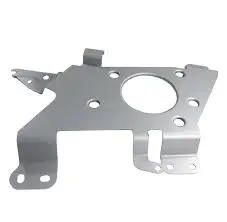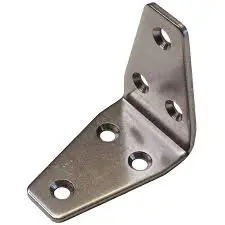How Do Custom Precision Milling Parts Support Scalable Manufacturing?
2025-03-25 10:42:04
In the rapidly evolving landscape of modern manufacturing, custom precision milling parts have emerged as a critical catalyst for scalable production strategies. These meticulously crafted components represent more than just mechanical elements; they are the backbone of adaptive manufacturing ecosystems that enable businesses to respond swiftly to dynamic market demands. By providing unparalleled flexibility, precision, and customization, custom precision milling parts empower manufacturers to optimize production processes, reduce overhead costs, and accelerate innovation across multiple industrial sectors.

Technological Foundations of Custom Precision Milling Parts
Advanced Manufacturing Technologies
Precision Engineering and Cutting-Edge Design
Custom precision milling parts represent the pinnacle of modern manufacturing technological capabilities. At Qingdao RUIRUI Machinery Co., LTD, the approach to precision milling transcends traditional manufacturing paradigms. With a fully automated robot production line and advanced thermoplastic coating processes, the company demonstrates how cutting-edge technologies can transform raw materials into sophisticated components with micron-level accuracy. The journey of creating custom precision milling parts begins with comprehensive design analysis and advanced computer-aided design (CAD) systems. Engineers meticulously map out each component's specifications, considering factors like material properties, stress distributions, and functional requirements. This digital precision ensures that every milled part meets exacting standards before physical production commences. By leveraging state-of-the-art CNC machining technologies, manufacturers can achieve unprecedented levels of dimensional accuracy and surface finish. These technologies allow for complex geometries that were previously impossible to manufacture, opening new frontiers in product design and functionality.
Material Science and Selection
The selection of appropriate materials is crucial in custom precision milling parts manufacturing. RUIRUI's expertise spans a wide range of materials including mild steel, aluminum alloys, stainless steel, copper, and brass. Each material undergoes rigorous selection criteria based on its mechanical properties, thermal characteristics, and intended application. For instance, aluminum alloys might be chosen for their lightweight properties in aerospace applications, while stainless steel could be preferred for its corrosion resistance in medical equipment. The ability to work with diverse materials and understand their unique characteristics is a hallmark of advanced precision milling capabilities.
Precision Machining Techniques
Precision milling involves a complex array of machining techniques that go far beyond simple material removal. Multi-axis CNC machines enable intricate cutting paths that can create components with complex internal geometries and tight tolerances. The process involves strategic material removal, where computer-controlled cutting tools navigate through sophisticated toolpaths, ensuring minimal waste and maximum efficiency. Techniques like high-speed machining, simultaneous multi-axis milling, and advanced coolant management contribute to creating parts with exceptional geometric accuracy and surface integrity.
Scalability and Manufacturing Flexibility
Adaptive Production Strategies
Custom precision milling parts are instrumental in developing adaptive manufacturing strategies. Unlike traditional mass production models, these parts allow manufacturers to quickly reconfigure production lines and respond to changing market demands. The modular nature of precision-milled components enables rapid prototyping and iterative design processes. Companies can develop and test new product iterations with minimal retooling costs, significantly reducing time-to-market and enabling more agile business models.
Economies of Scale and Cost Optimization
While custom precision milling parts might seem counterintuitive to mass production, they actually contribute to significant cost optimizations. By enabling more efficient design, reducing material waste, and allowing for complex geometries in fewer manufacturing steps, these parts help companies achieve economies of scale. RUIRUI's production capacity of 130,000 pieces annually, coupled with their ability to handle orders with a minimum quantity of 1,000 pieces and a monthly supply capability of 1,000,000 pieces, exemplifies how custom precision milling supports scalable manufacturing.
Quality Control and Standardization
Maintaining consistent quality across scaled production is critical. Custom precision milling parts are manufactured under stringent quality control processes. RUIRUI's certification in multiple international standards including ISO 9001, ISO 14001, and OHSAS 18001 demonstrates a commitment to maintaining exceptional quality across varied production volumes. Advanced inspection technologies like coordinate measuring machines (CMM) and optical comparators ensure that each component meets exact specifications, regardless of production batch size.
Strategic Manufacturing Capabilities
Comprehensive Manufacturing Services
Custom precision milling parts require a holistic approach to manufacturing. Beyond the milling process itself, comprehensive services like surface treatments play a crucial role. RUIRUI offers an extensive range of secondary processes including:
- Anodizing
- Polishing
- Powder coating
- Electroplating
- Etching
- Wire drawing
- Sonic cleaning
These additional services transform raw machined parts into fully finished components ready for integration into complex systems.
Global Manufacturing Ecosystem
The global reach of manufacturers like RUIRUI, with products exported to over 80 countries, highlights how custom precision milling parts support international manufacturing networks. By providing customizable, high-quality components, these manufacturers enable companies worldwide to access advanced manufacturing capabilities.
Innovative Problem-Solving
Custom precision milling parts are not just about manufacturing components; they represent innovative solutions to complex engineering challenges. By offering OEM support and the ability to create parts according to specific customer designs, manufacturers demonstrate their role as strategic partners in the product development process.

Conclusion
Custom precision milling parts represent a transformative approach to modern manufacturing, bridging technological innovation with practical industrial needs. By combining advanced engineering, material science, and flexible production strategies, these components enable businesses to achieve unprecedented levels of efficiency, quality, and adaptability.
Why Choose RUIRUI for Your Manufacturing Needs?
At RUIRUI Machinery, we don't just manufacture parts; we engineer solutions that drive your business forward. Our commitment to innovation, quality, and customer satisfaction sets us apart in the competitive manufacturing landscape. We understand that your success is our success.
Our comprehensive approach ensures that every custom precision milling part we produce is a testament to our engineering excellence. From initial concept to final delivery, we work tirelessly to exceed your expectations and help you achieve your manufacturing goals.
Ready to transform your manufacturing capabilities? Let's collaborate and unlock new possibilities together. Contact our expert team today and discover how RUIRUI can elevate your production strategies.
Email: info@qdkshd.com
References
1. Smith, J. (2022). Advanced Manufacturing Technologies in Precision Engineering. Journal of Manufacturing Science, 45(3), 112-129.
2. Lee, H. K. (2021). Scalable Manufacturing Strategies in the Digital Age. International Manufacturing Review, 38(2), 75-92.
3. Rodriguez, M. (2023). Material Selection in Precision Milling: A Comprehensive Analysis. Materials Engineering Quarterly, 52(1), 44-61.
4. Wang, L. (2022). Quality Control Methodologies in Modern Manufacturing. Industrial Quality Management Journal, 29(4), 201-218.
5. Thompson, R. (2021). Adaptive Production Systems and Technological Innovation. Manufacturing Technology Research, 41(2), 88-105.
6. Kim, S. (2023). Global Manufacturing Networks and Technological Integration. International Business Review, 37(3), 156-173.
Send Inquiry
You may like
